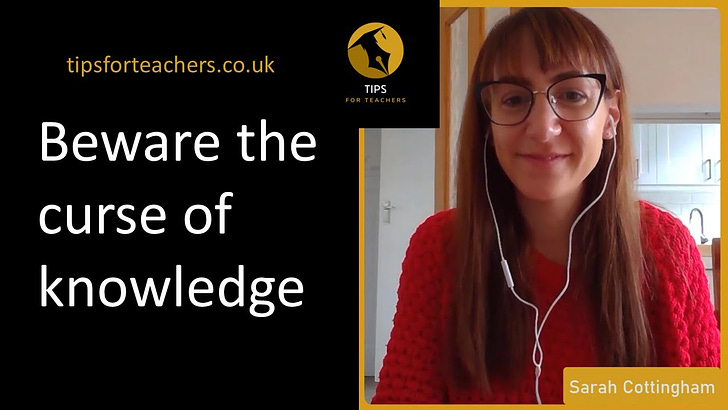Hello, and welcome to the Tips for Teachers newsletter. For over 400 ideas to try out the very next time you step into the classroom, check out my Tips for Teacher book.
💡 A quick tip to try in class this week 💡
Consider the following exchange:
Teacher: What is the formula to work out the area of a triangle?… (wait)… Kate?
Kate: Base multiplied by perpendicular height, divided by two
Teacher: … (wait)… correct
There is a lot to be admired about it:
The initial thinking time to give students chance to think about the answer
Putting the name at the end of the question to provide an incentive for all students to think
The correct use of technical language by the student
The second thinking time to give students an opportunity to process their peer’s answer before the teacher evaluates it
But there is another improvement that could be made, and it is one I rarely see in maths classrooms: the requirement for students to respond in complete sentences.
So instead, we might have:
Teacher: What is the formula to work out the area of a triangle?… (wait)… Kate?
Kate: Base multiplied by perpendicular height, divided by two
Teacher: Full sentence, please
Kate: The formula to work out the area of a triangle is base multiplied by perpendicular height, divided by two
Teacher: … (wait)… correct
Why is asking students to respond in full sentences a good idea? Well, for three reasons:
It reduces the chance of knowledge being fragmented and meaningless. In the first version of the exchange, the first and second parts of the statement are separated, both by time and additional dialogue. On its own, base multiplied by perpendicular height, divided by two is meaningless. If students remember it, then so what? But when combined with the first part of the statement, we have something that makes sense and is worth remembering.
It may help improve students’ written communication. If students cannot respond in full sentences, it seems they will be less likely to write in full sentences (something I discussed with literacy expert, Alex Quigley, here). The way we speak is often very different to the way we write, so if we can promote this more formal way of responding, it could provide a smoother transition for when we ask students to write in full sentences. And students need this practice. A cursory look through any maths GCSE examiner’s report reveals just how much students struggle with questions that ask them to explain, describe and discuss.
It helps students who might not have been paying attention. Imagine a student, Isaac, has not been paying full attention. He tunes it at the part of the exchange where Kate responds: Base multiplied by perpendicular height, divided by two. He has no clue what that means. In the second version of the exchange, with the question and answer united, Isaac has a better chance of making sense of it.
One final point: students are likely to wonder why you are asking them to do this, and may even be resistant to your request. As with many teaching strategies, it is a good idea to explain to students why you want them to do this. Explain the benefits, and more should get on board.
What would you need to change to make this tip work for you?
When could you try it for the first time?
View all the Tips for Teachers shared so far
📺 A video to discuss with a colleague 📺
Learning design expert, Sarah Cottingham, discusses the curse of knowledge
If the video doesn't play when you click on it, click here
For 200+ videos on all aspects of teaching, categorised and ready to view, click here
👂 A podcast episode to listen to on your way home 👂
Primary teacher and reading expert, Chris Such, shares his five tips:
Learn about reading development
Analyse words using morphology and etymology
Assess reading difficulties and respond
Feign enthusiasm when necessary
Depressurise learning
Listen to the podcast here.
Search for Tips for Teachers on any podcast platform (Apple Podcasts, Spotify, etc) and subscribe so you never miss an episode.
😎 Final bits and bobs 😎
Do you know someone who would enjoy this newsletter? Forward it to them, or direct them to the sign-up page here where you can also read all previous editions.
You can also sign up to my weekly Eedi newsletter, where I share resources, research and ideas to improve teaching and learning.
Check out my Tips for Teachers book
Do you and your team want high-quality training or coaching, with ideas you can use in your very next lesson? If so, you can book some Tips for Teachers CPD
Check out the all-new Tips for Teachers online courses
If you value my work, please consider becoming a Patreon



